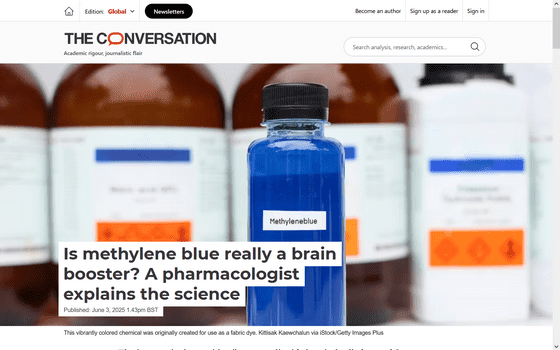Is it true that methylene blue is an 'all-purpose supplement' that can improve memory, boost energy, improve mood, and more?

Rumors have started circulating on social media that a substance called '
Is methylene blue really a brain booster? A pharmacologist explains the science
https://theconversation.com/is-methylene-blue-really-a-brain-booster-a-pharmacologist-explains-the-science-257159

What methylene blue can (and can't) do for the brain - Neurofrontiers
Methylene blue is a synthetic dye that exists as a dark green powder that turns a dark blue color when dissolved in water. Unlike commonly used food colorings, methylene blue is not derived from petroleum and is therefore not believed to have the health effects often associated with food colorings.
Methylene blue was first synthesized in 1876 as a textile dye, prized for its intense color and ability to bind to fabrics, and later became one of the first synthetic drugs used in medicine when German physician Paul Ehrlich discovered its ability to stain biological tissue and kill the parasite that causes malaria.
However, methylene blue was not widely used as a treatment for malaria because it was less effective than quinine, which was the standard treatment at the time. In the 1930s, a new use for methylene blue was found for testing the safety of raw or unpasteurized milk, and a method was established to determine whether the milk was contaminated with bacteria if the blue color faded quickly, but if the blue color remained, the milk was relatively clean. However, this method is now largely outdated.

Today, methylene blue is used to treat a blood disorder called
So far, we have seen that methylene blue may improve learning, enhance memory, and protect brain cells in rats in a condition that mimics Alzheimer's disease. We have also seen that methylene blue protects the brain from brain damage in rats, and that methylene blue is useful in treating ischemic stroke in rats, but neither of these have been shown to have the same effects in humans.

'Methylene blue is generally safe when used under medical supervision. However, it is important to remember that it can interact with other commonly used medications,' said Professor Lone J. Hofses, of the University of South Carolina School of Pharmacy. 'For example, methylene blue inhibits a molecule called monoamine oxidase, which breaks down serotonin. Taking it with medications used to treat anxiety or depression can cause a condition called serotonin syndrome, which can lead to agitation, confusion, high fever, rapid heart rate, muscle stiffness, and in severe cases, seizures or even death.'
in Science, Posted by log1p_kr